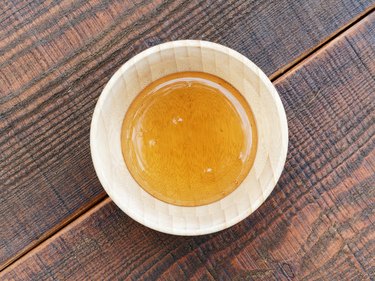
If you have a sweet tooth and want to watch your weight, you may wonder about the amount of calories in honey. A look at this natural sweetener's nutrition, impact on health and potential benefits can help you decide whether to include it in your diet.
Tip
There are 21.27 calories in a teaspoon of regular honey and 20 calories in a teaspoon of raw honey.
Video of the Day
Nutrition and Calories in Honey
Before adding this sweetener to your diet, consider the calories in honey. According to the USDA, there are 63.8 calories in a tablespoon of regular, or processed, honey.
Video of the Day
Since there are three teaspoons in every tablespoon, this works out to just over 21 calories per teaspoon of this sticky sweetener. Honey also contains 17.3 grams of carbohydrates and 17.2 grams of sugar per tablespoon, which is nearly six grams of each per teaspoon.
The USDA reports that raw honey has a similar nutritional profile. There are 60 calories in each tablespoon of raw honey or 20 calories per teaspoon. Raw honey has 17 grams of carbohydrates and 16 grams of sugar per tablespoon.
If you're using one teaspoon of honey, you can work it into your daily calorie count with ease. However, you may need to measure your honey to ensure you stay on track carefully. People all need different amounts of calories based on their goals, activity levels, age, sex and other factors.
Read more: Recommended Caloric Intake for Weight Loss
Benefits of Honey
There are about 320 different types of honey to satisfy your sweet tooth. While the calories in honey remain about the same, they may contain varying levels of things such as:
- Amino acids
- Zinc
- Minerals
- Antioxidants
- Iron
Researchers have looked into how this sweetener may hold properties that fight bacteria, inflammation and free radicals. However, it's important to note that research about honey is difficult to standardize because of the nature of its production. So far, some research has suggested that honey can help:
- Reduce the risk of heart disease
- Promote healing in some wounds, especially burns
- Suppress coughing in people with respiratory infections
- Fight depression, anxiety and convulsions
- Relieve some symptoms associated with gastroenteritis
While the uses of honey may be plentiful, never give this substance to infants under one year of age. Even the smallest amount of honey can put babies at risk of botulism. Both raw and processed honey pose this threat.
Honey vs Other Sweeteners
While there may be many benefits of honey in the morning cup of tea, it's important to weigh it against other sweeteners. If you're watching your carbohydrate and sugar intake, you may think about choosing artificial sweeteners instead of honey. The primary forms of artificial sweeteners are sucralose, Splenda and aspartame.
Because artificial sweeteners have no calories or carbohydrates, the Mayo Clinic reports that they may be good choices for people with diabetes. However, the Food and Drug Administration (FDA) sets acceptable daily intake limits on these sweeteners and does not recommend them for people with phenylketonuria.
If you plan on using honey to replace table sugar, you may find little or no benefit when it comes to blood sugar and weight loss. The Mayo Clinic reports that honey is sweeter than table sugar, so people may use less in some cases. However, since honey has more calories per teaspoon than sugar, you may not benefit much.
Was this article helpful?
150 Characters Max
0/150
Thank you for sharing!
Thank you for your feedback!